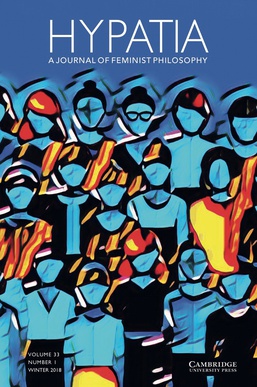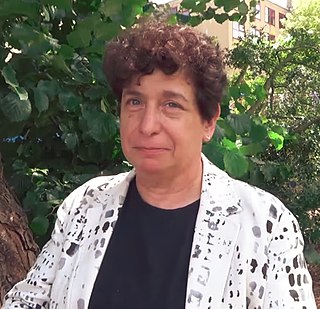The ethics of care is a normative ethical theory that holds that moral action centers on interpersonal relationships and care or benevolence as a virtue. EoC is one of a cluster of normative ethical theories that were developed by some feminists and environmentalists since the 1980s. While consequentialist and deontological ethical theories emphasize generalizable standards and impartiality, ethics of care emphasize the importance of response to the individual. The distinction between the general and the individual is reflected in their different moral questions: "what is just?" versus "how to respond?" Carol Gilligan, who is considered the originator of the ethics of care, criticized the application of generalized standards as "morally problematic, since it breeds moral blindness or indifference".

Iris Marion Young was an American political theorist and socialist feminist who focused on the nature of justice and social difference. She served as Professor of Political Science at the University of Chicago and was affiliated with the Center for Gender Studies and the Human Rights program there. Her research covered contemporary political theory, feminist social theory, and normative analysis of public policy. She believed in the importance of political activism and encouraged her students to involve themselves in their communities.
Feminist philosophy is an approach to philosophy from a feminist perspective and also the employment of philosophical methods to feminist topics and questions. Feminist philosophy involves both reinterpreting philosophical texts and methods in order to supplement the feminist movement and attempts to criticise or re-evaluate the ideas of traditional philosophy from within a feminist framework.
Sarah Lucia Hoagland is the Bernard Brommel Distinguished Research Professor and Professor Emerita of Philosophy and Women's Studies at Northeastern Illinois University in Chicago.
Alison Wylie is a Canadian philosopher of archaeology. She is a professor of philosophy at the University of British Columbia and holds a Canada Research Chair in Philosophy of the Social and Historical Sciences.

Hypatia: A Journal of Feminist Philosophy is a peer-reviewed academic journal published quarterly by Cambridge University Press. As of January 2024, the journal is led by co-editors Katharine Jenkins, Aidan McGlynn, Simona Capisani, Aness Kim Webster, and Charlotte Knowles. Book reviews are published by Hypatia Reviews Online (HRO). The journal is owned by a non-profit corporation, Hypatia, Inc. The idea for the journal arose out of meetings of the Society for Women in Philosophy (SWIP) in the 1970s. Philosopher and legal scholar Azizah Y. al-Hibri became the founding editor in 1982, when it was published as a "piggy back" issue of the Women's Studies International Forum. In 1984 the Board accepted a proposal by Margaret Simons to launch Hypatia as an autonomous journal, with Simons, who was guest editor of the third (1985) issue of Hypatia at WSIF, as editor. The editorial office at Southern Illinois University Edwardsville handled production as well until Simons, who stepped down as editor in 1990, negotiated a contract with Indiana University Press to publish the journal, facilitating the move to a new editor.

Alice Crary is an American philosopher who currently holds the positions of University Distinguished Professor at the Graduate Faculty, The New School for Social Research in New York City and Visiting Fellow at Regent's Park College, University of Oxford, U.K..
María Cristina Lugones was an Argentine feminist philosopher, activist, and Professor of Comparative Literature and of women's studies at Carleton College in Northfield, Minnesota and at Binghamton University in New York State. She identified as a U.S-based woman of color and theorized this category as a political identity forged through feminist coalitional work.

Elizabeth Secor Anderson is an American philosopher. She is Arthur F. Thurnau Professor and John Dewey Distinguished University Professor of Philosophy and Women's Studies at the University of Michigan and specializes in political philosophy, ethics, and feminist philosophy.
Margaret Urban Walker is an American philosopher and academic who is the Donald J. Schuenke Chair Emerita in Philosophy at Marquette University. Before her appointment at Marquette, she was the Lincoln Professor of Ethics at Arizona State University, and before that she was at Fordham University. She has also previously held visiting appointments at Washington University in St. Louis, University of South Florida, and Catholic University of Leuven.
Alison Mary Jaggar is an American feminist philosopher born in England. She is College Professor of Distinction in the Philosophy and Women and Gender Studies departments at the University of Colorado, Boulder and Distinguished Research Professor at the University of Birmingham in the United Kingdom. She was one of the first people to introduce feminist concerns in to philosophy.

Ecofeminism is a branch of feminism and political ecology. Ecofeminist thinkers draw on the concept of gender to analyse the relationships between humans and the natural world. The term was coined by the French writer Françoise d'Eaubonne in her book Le Féminisme ou la Mort (1974). Ecofeminist theory asserts a feminist perspective of Green politics that calls for an egalitarian, collaborative society in which there is no one dominant group. Today, there are several branches of ecofeminism, with varying approaches and analyses, including liberal ecofeminism, spiritual/cultural ecofeminism, and social/socialist ecofeminism. Interpretations of ecofeminism and how it might be applied to social thought include ecofeminist art, social justice and political philosophy, religion, contemporary feminism, and poetry.
Ann E. Cudd is an American academic. She is the president of Portland State University as of August 1, 2023. She was previously the provost and senior vice chancellor and professor of philosophy at the University of Pittsburgh and dean of the college and graduate school of arts and sciences at Boston University.
Alia Al-Saji is James McGill Professor of Philosophy at McGill University. Her work focuses on bringing 20th century phenomenology and French philosophy into dialogue with critical race and feminist theories. Al-Saji believes that feminist phenomenology must take an intersectional approach to its work, one that accounts for the fact that gender cannot be treated in a vacuum apart from other axes of oppression.
Dale Jamieson is Professor of Environmental Studies and Philosophy at New York University, a scholar of environmental ethics and animal rights, and an analyst of climate change discourse. He also serves as a faculty affiliate for the NYU School of Law and as director of NYU's Animal Studies Initiative, which was funded by Brad Goldberg with a $1 million donation in 2010. In addition to his affiliation with the NYU Departments of Environmental Studies and Philosophy, Jamieson also holds positions at The Dickson Poon School of Law and at the University of the Sunshine Coast in Australia.

Joan Claire Tronto, is professor of political science at the University of Minnesota, and was previously professor of women's studies and political science at Hunter College and the Graduate School, City University of New York.
Rebecca Suzanne Whisnant is professor and chair of the philosophy department at the University of Dayton.
Carol C. Gould is an American philosopher and feminist theorist. Since 2009, she has taught at City University of New York, where she is currently Distinguished Professor of Philosophy at Hunter College, and in the Doctoral Programs of Philosophy and Political Science at the CUNY Graduate Center, where she is Director of the Center for Global Ethics and Politics at the Ralph Bunche Institute. Gould is also editor-in-chief of the Journal of Social Philosophy. Her 2004 book Globalizing Democracy and Human Rights received the 2009 David Easton Award which is given by the American Political Science Association "for a book that broadens the horizons of contemporary political science." Her 2014 book Interactive Democracy: The Social Roots of Global Justice received the 2015 Joseph B. Gittler Award from the American Philosophical Association for "an outstanding scholarly contribution in the field of the philosophy of one or more of the social sciences."

The feminist philosophy journal Hypatia became involved in a dispute in April 2017 that led to the online shaming of one of its authors, Rebecca Tuvel, an assistant professor of philosophy at Rhodes College in Memphis. The journal had published a peer-reviewed article by Tuvel in which she compared the situation of Caitlyn Jenner, a trans woman, to that of Rachel Dolezal, a white woman who identifies as black. When the article was criticized on social media, scholars associated with Hypatia joined in the criticism and urged the journal to retract it. The controversy exposed a rift within the journal's editorial team and more broadly within feminism and academic philosophy.
Susan Leslie Campbell was a Canadian philosopher whose work addressed philosophical psychology, feminist philosophy, aesthetics, and ethics.






